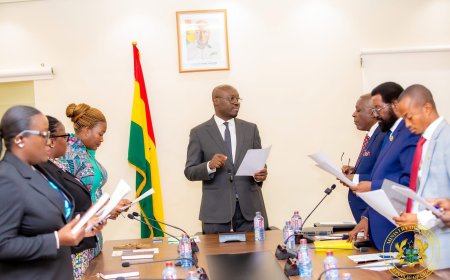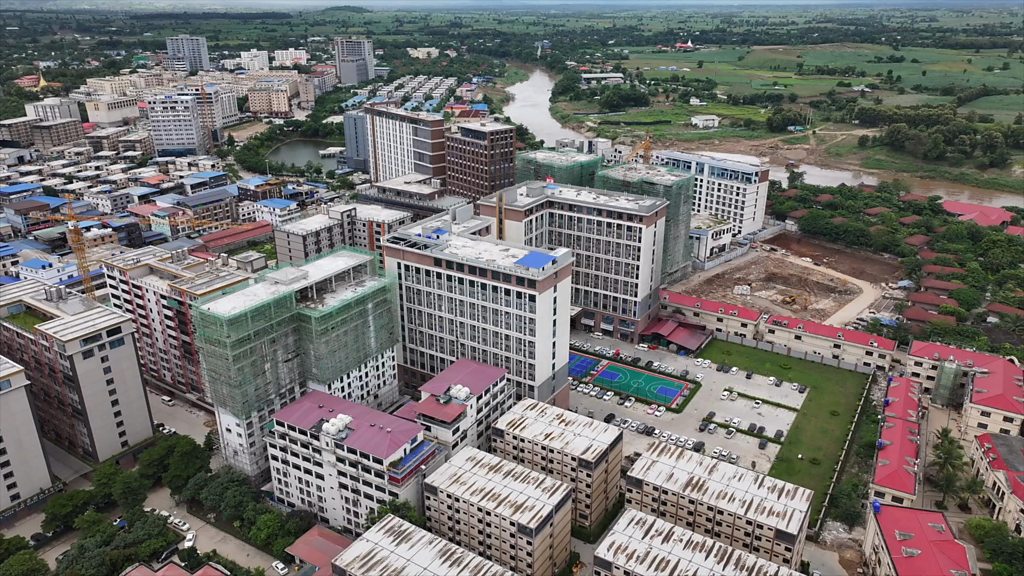Air Pollution: Breathing New Life into Lagos, Africa's biggest Economic hub
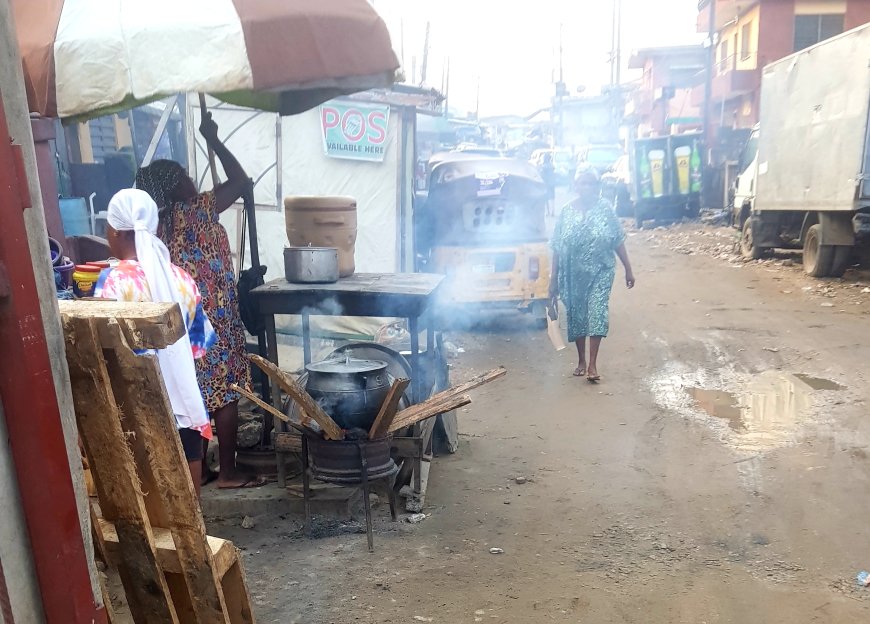
Lagos, Nigeria - September 13, 2024 - The air is thick with a haze that has become all too familiar to residents. The skyline is blurred, not by distance, but by pollution, a silent killer that claims millions of lives each year globally. Air pollution is a transboundary issue, disregarding national borders and affecting the health of people thousands of miles away from its source.
In Nigeria, this issue is a pressing concern in Lagos state, Nigeria’s busy economic hub and one of Africa’s largest and fastest-growing megacities, where about 20 million residents face daily exposure to dangerous levels of air pollutants including vehicular emissions, industrial activities, open burning of waste, and domestic cooking practices.
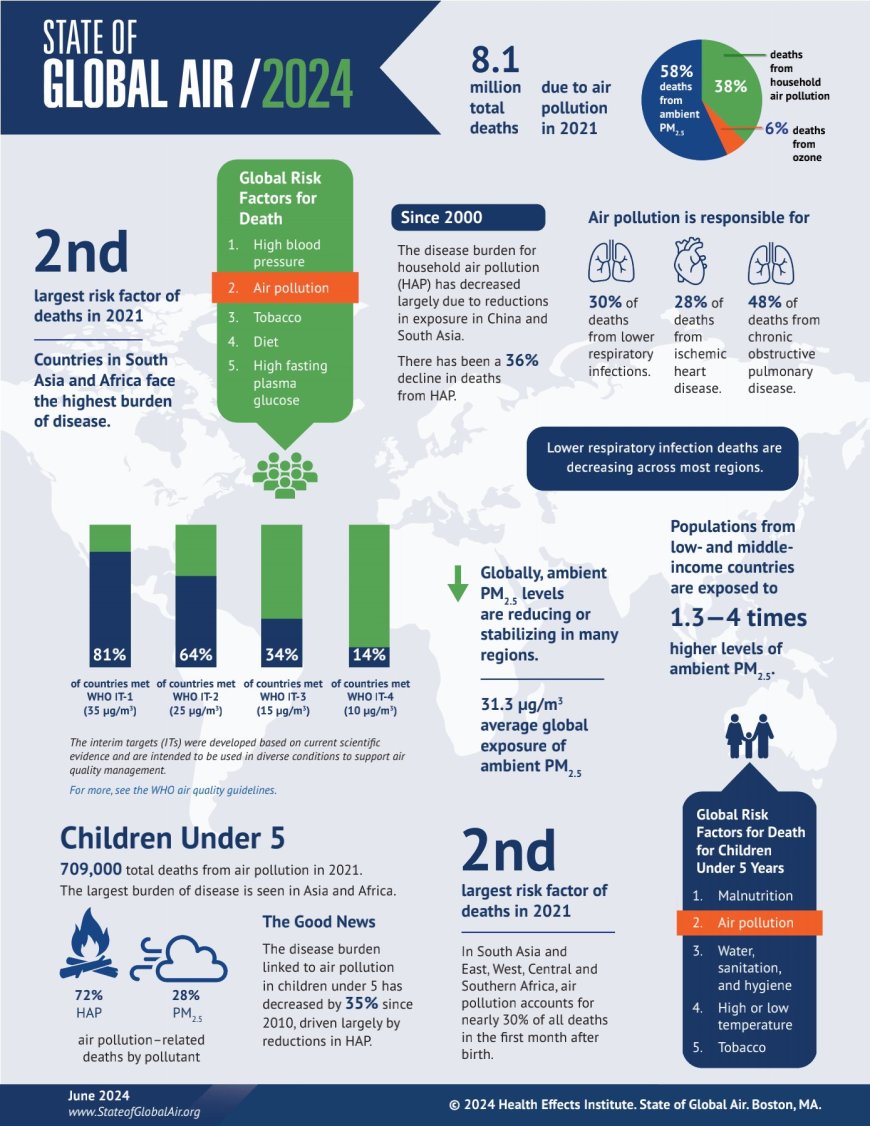
According to World Health Organization (WHO), exposure to high levels of air pollution can cause various health outcomes. Increased health risks, such as respiratory infections, heart disease, stroke, and lung cancer, can severely affect people who are already ill, such as children, the elderly, and poor people. Furthermore, poor air quality increases the risk of stillbirth, miscarriage, and neurological conditions such as cognitive impairment and dementia.
Recent studies and expert insights reveal the dire consequences of poor air quality on public health, emphasizing the urgent need for comprehensive air quality management strategies. This call to action was echoed at the Lagos CLEAN-Air Forum 2024, where experts from across the continent and beyond convened to address the critical issue of air pollution and its impact on health, climate and environmental sustainability.
The Global Burden of Air Pollution and its Toll on African Cities
In 2019, air pollution caused about 6.7 million deaths. Of these, almost 85% are attributable to noncommunicable diseases (NCDs), including ischemic heart disease, stroke, lung cancer, asthma, chronic obstructive pulmonary disease (COPD), and diabetes. This makes air pollution the second leading cause of NCDs globally after tobacco, according to WHO report on Air quality, energy and health.
The State of Global Air 2024 reports shows that Air pollution accounted for 8.1 million deaths globally in 2021, becoming the second leading risk factor for death, including for children under five years. Of the total deaths, noncommunicable diseases including heart disease, stroke, diabetes, lung cancer, and chronic obstructive pulmonary disease (COPD) account for nearly 90% of the disease burden from air pollution.
Globally, more than 99% of the population live in areas where the air pollution is above WHO air quality guidelines and 4.2 million deaths are attributed to ambient air pollution each year. Around 2.4 billion people cook and heat their homes with polluting fuels and every year 3.2 million people die prematurely from household air pollution.
More than 700,000 deaths in children under 5 years were linked to air pollution; this represents 15% of all global deaths in children under five. In some countries in Africa and South Asia, nearly 1 in every 3 lower respiratory infection deaths in children under 5 is linked to air pollution.
The Intricate Air Pollution Landscape in Lagos
A World Bank study identified top three sources of particulate matter (PM2.5) pollution in Lagos as road transport, industrial emissions, and generators, all of which could be mitigated with effective interventions. Road transport is the leading source of PM2.5. Due to limited transportation options, the number of vehicles has nearly quadrupled over the past decade.
The average commute in Lagos takes four hours a day, the highest in the world. Every day, 227 vehicles congest each kilometer of road, with most vehicles being over 15 years old and using outdated emission technologies and fuel with sulfur levels 200 times higher than U.S. standards for diesel according to the study.
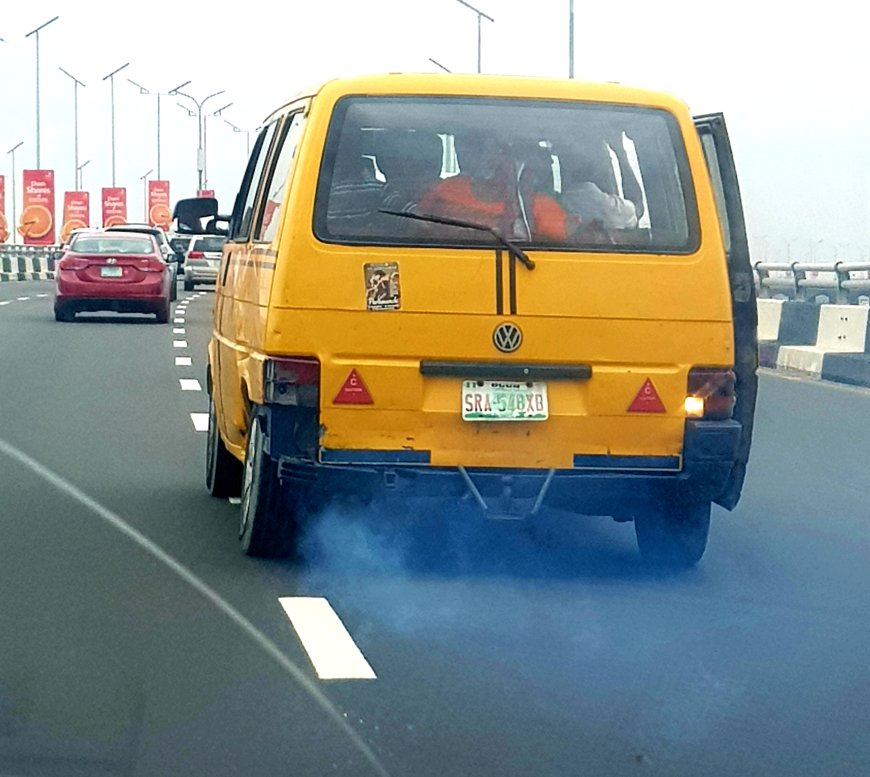
A commercial emitting harmful smoke into the air at third mainland bridge, Lagos State, Nigeria.
Vehicular emissions stand as one of the most significant sources of air pollution in Lagos. The city’s traffic congestion is notorious, with countless cars, buses, and motorcycles releasing a cocktail of pollutants such as nitrogen dioxide (NO2), carbon monoxide (CO), and particulate matter (PM) into the atmosphere. The aged and poorly maintained fleet of vehicles exacerbates the situation, as they tend to emit higher levels of harmful substances compared to newer models with better emission control technologies.
Industrial activities also contribute significantly to the air pollution problem in Lagos. The city hosts numerous factories and manufacturing plants, many of which operate with minimal environmental oversight. These industrial facilities emit a range of pollutants, including sulfur dioxide (SO2), volatile organic compounds (VOCs), and heavy metals, which deteriorate air quality and pose severe health risks to nearby communities.
Another pressing issue is the open burning of waste, a common practice in Lagos due to inadequate waste management infrastructure. Residents often resort to burning trash in open spaces, releasing toxic fumes and particulate matter into the air. This practice not only contributes to air pollution but also exacerbates respiratory problems among the population.
Domestic cooking practices further add to the air pollution burden. Many households in Lagos still rely on traditional biomass fuels such as wood, charcoal, and kerosene for cooking. The use of these fuels generates significant amounts of indoor air pollutants, including fine particulate matter and carbon monoxide, which can cause respiratory illnesses, especially in poorly ventilated homes.
Nigeria's vibrant economy, large population, and unreliable power sector have led to a heavy reliance on backup generators. In Lagos, generators provide about half of the city's total energy demand, making them the third-largest source of PM2.5. Large diesel generators are used in institutional, commercial, and residential areas, while smaller generators are widespread across households and small businesses. The poor combustion of gasoline and lubricating oil in these generators significantly pollutes the air and poses major health risks due to their close proximity to people.
Air Pollution Cuts Deep Regardless of Socioeconomic Status
Air pollution in Africa is a pervasive and pressing issue, affecting every individual regardless of their socioeconomic status. Bimbo Oshobe, the president of the Slum and Informal Settlement Federation, Lagos, emphasized this on the nature and extent of air pollution in the Lagos. Oshobe highlighted that air pollution is not a challenge faced by a single person but a collective problem that impacts everyone.
"Every day, our activities bring us face-to-face with the reality of unclean air," Oshobe explained. "It's not just the poor who suffer; whether you're rich, poor, or physically challenged, the air quality affects us all. For instance, you might get exposed to smoke from a neighbour using firewood for cooking or from small generators commonly referred to as 'I better pass my neighbour.' These generators, while providing necessary electricity, emit harmful smoke and noise, contributing significantly to air pollution."
Oshobe pointed out the daily encounters with air pollution that people often overlook. "Think about the smoke from generators; we've seen cases where this smoke has tragically killed families. These stories come from various areas, yet many people remain unconcerned because they feel it hasn't affected them personally. But every time you step outside, whether at a bus stop or near a street vendor, you're breathing in this unclean air."
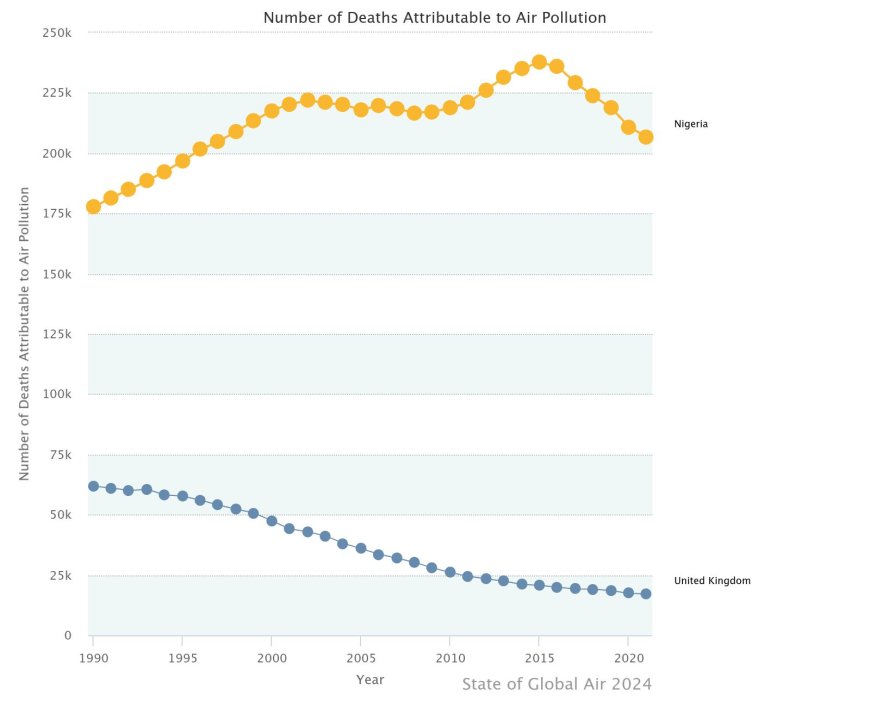
Map showing air pollution related deaths compared between Nigeria and Europe. Data Source: state of global air 2024
The challenge extends beyond the streets into communities where residents interact daily. "We need to educate our community members," Oshobe stressed. "It's not just about the pollution you face on the streets, but also the air quality within our neighbourhoods. How do we communicate to people that they need to seek cleaner air solutions? For instance, I once spoke to a woman who couldn't afford firewood or charcoal and was using plastic waste to cook. I explained to her that while this might seem like a quick solution, it's causing severe health damage over time."
Oshobe recounted, "I told her, 'You might be able to make a living now, but by inhaling these toxic fumes, you're shortening your lifespan. The children you're working so hard for might grow up without you.' It's essential to make people understand the long-term health implications of their current practices" she added.
Public and Stakeholders Engagement in Air Quality Management
Engaging the public and stakeholders in air quality management is crucial for addressing the persistent problem of air pollution in Lagos. Dr. Bolajoko Malomo, a social researcher and lecturer at the Department of Psychology, University of Lagos, emphasized the significance of such engagements, noting that Nigeria's fast-growing population exacerbates the need to understand and protect the quality of air—a shared resource essential for life.
"Air pollution is inherently a social problem," Dr. Malomo stated, "because it affects everyone who breathes the air." She highlighted that, according to a World Health Organization (WHO) study, approximately 4.2 million people die prematurely each year from diseases caused by ambient air pollution. These diseases include heart disease, cancer, and respiratory illnesses, which collectively underscore the severe public health impact of poor air quality.
"The air we breathe is a shared resource; there is a need to engage and protect it," Dr. Malomo continued. She stressed that human activities, from industrial emissions to vehicular pollution and waste burning, significantly contribute to air quality degradation. Addressing these activities through targeted interventions and public awareness is essential.
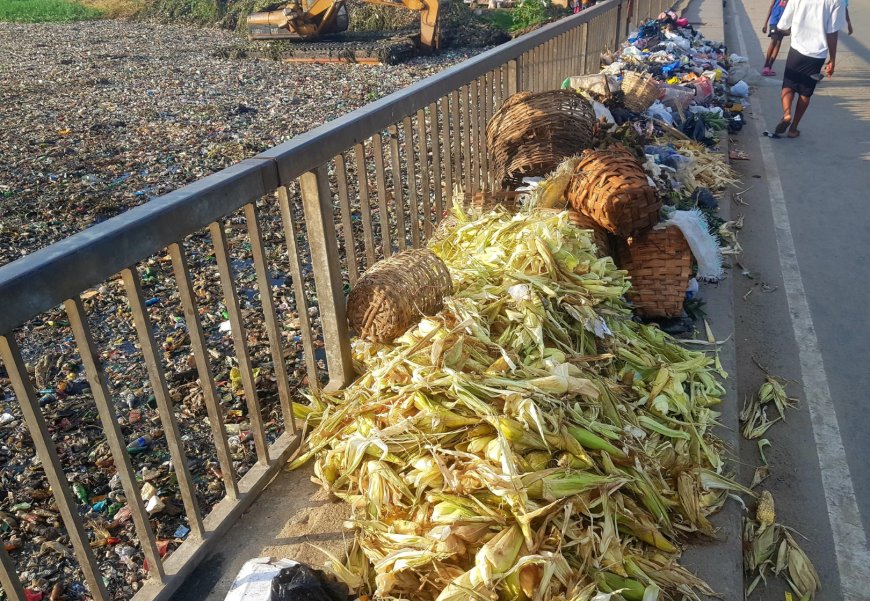
Poorly disposed waste increases levels of pollution across urban and rural areas in Lagos State, Nigeria.
Dr. Malomo advocated for leveraging education and community engagement as pivotal strategies in combating air pollution. "There is a need to educate people on pro-environmental protection programs," she said. "By raising awareness about the sources and effects of air pollution, communities can adopt more sustainable practices and support initiatives aimed at improving air quality."
She also emphasized the importance of participatory programs that involve various stakeholders, including local communities, government agencies, and non-governmental organizations. These programs can facilitate the sharing of knowledge and resources, fostering a collaborative approach to air quality management.
Furthermore, Dr. Malomo pointed out the necessity of integrating air quality education into school curricula and community outreach programs. By instilling environmental consciousness from a young age and continuously engaging the broader public, Lagos can build a more informed and proactive population ready to tackle the challenges of air pollution.
Collaboration at All Levels Key to Improving Air Quality
Dare Olasunbo Bola, an air quality expert at the Air Quality Department, Emission Control Unit (AQECu) of the Lagos State Environmental Protection Agency (LASEPA), highlighted the significant strides made in air quality management in Africa and beyond. However, she emphasized the need for more inclusive collaboration that extends to the grassroots level to achieve lasting improvements in air quality.
"There has been great work and collaboration concerning air quality in Africa and abroad. My suggestion is that as there is collaboration between stakeholders and partners, there should also be collaboration with people from the lowest level," Bola said. She proposed involving local leaders such as public transportation chairmen, market women heads, and community chiefs. "This way, the information can be passed down to the lowest level of the air pollution source" she added.
Bola explained that these local leaders would select capable individuals who would be educated and empowered to disseminate information to the general public. “The goal is to raise awareness about the effects of smoke and emissions from vehicles, outdoor activities like cooking with firewood, sawdust, and burning waste, which all negatively impact air quality and health” she said.
"Making them aware of the effect of the smoke and emission from their vehicle, and how activities like cooking with firewood, sawdust, burning of their waste in their homes, etc., can affect the air and their health and that of their family and unborn children would go a long way,” Bola noted.
While acknowledging the financial constraints faced by many Nigerians, Bola suggested implementing penalties for non-compliance. "There should be a kind of penalties for going against the law. This I can't really ascertain because of the financial status of most Nigerians, but at least it will go a long way in making a huge change and the quality of air in the environment."
Bola shared a personal story to illustrate the general lack of awareness about air quality issues. "I was on my way to work some months ago when I was fortunate to be given a ride by a banker who works at Ojota. She asked where I work and my department. I told her and explained to her about air quality. She wasn't even aware of anything about air quality."
Bola stressed the importance of leveraging social media, content creators, influencers, radio and TV stations to educate the public about air quality. "Maybe there should be a weekly program on a well-known radio and TV station to educate the public about air quality. I suggest that there should be a very explanatory and pictorial or diagram posters placed in strategic areas in communities that explain air quality to the people."
Government Initiatives and Air Quality Management in Lagos
Earlier, at the Lagos Clean Air Forum 2024, Prof. Akin Abayomi, Hon. Commissioner for Health Lagos State, emphasized that poor air quality and a dense population have strained the health resources in Lagos, noting that the city is implementing the Lagos State Development Plan 2052 which aims to improve air quality and health infrastructure through clean air initiatives and technological advancements.
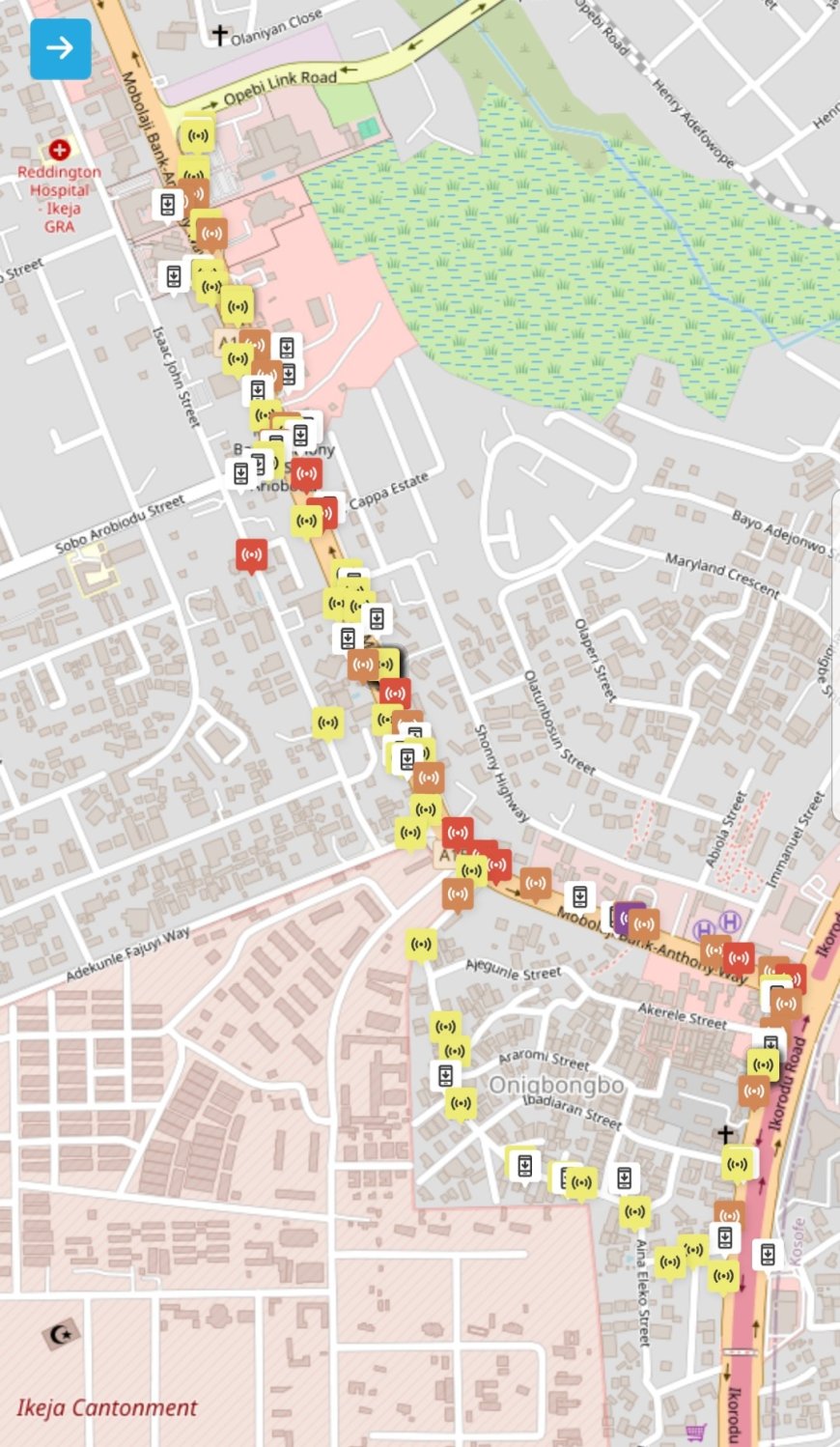
A map showing air quality data between Maryland and Ikeja the capital of Lagos State, Nigeria [Colour codes - Green means Good; Yellow means Moderate; Orange means Unhealthy for sensitive groups; Red means Unhealthy; Purple means Very Unhealthy and Maroon means Hazardous]. Data Source: AirQo/UrbanBetter
Engineer, Osa Konyeha, Technical Adviser, Corporate and Investment Planning at the Lagos Metropolitan Area Transport Authority (LAMATA), highlighted initiatives to optimize public transportation systems and reduce vehicular emissions.
In his words he shared that: “We at the moment are carrying out a project called the Bus Industry Transition Project (BITP). The project seeks to look at ways in which we can encourage the informal sector players to join in the formal sector, to become the related players in the transportation space. And that entails forming a cooperative, bringing in cleaner energy buses and running under the regulated space,” Konyeha said.
“We understand that informal sector players are very experienced in the transportation field, so we’re not trying to take away their livelihood. We are trying to encourage them to carry out their activities in a cleaner manner and under a regulated law. We will continue to work with the unions and the informal sector to better our relationship and we’ve been enjoying better relationships with them,” he added.
Konyeha shared further that “we can only carry on with our stakeholder engagement with them and with the aid of our BITP project, we continue to encourage them to work with us in order to provide the best service that we can for the citizens of Lagos state. So it’s a continuous process and we are getting a lot of support at the moment with working with the unions.”
The General Manager of Lagos State Environmental Protection Agency (LASEPA), Dr. Tunde Ajayi, speaking on initiatives towards tackling the problem of air pollution in Lagos highlighted that the state is making significant strides in improving indoor air quality in Lagos. Switching to clean energy for cooking and providing free gas through recycling initiatives, enforcing smoking laws indoors to reduce air pollution and protect public health.
Addressing the specific causes of pollution in Lagos, Dr. Ajayi noted various initiatives targeted at different areas. “For example, in Bariga, we are building a team for the women to tackle pollution because of their fish smoking trade. In several other areas like in Ikorodu, we are insisting that organizations and industries install pollution abatement plants” he said.
“In other areas in Lagos, we ensure that people reduce the amount of pollution they emit into the system. We also stop open burning in many communities, we ensure that their waste is properly disposed in a more controlled way and we hand solid waste to Lagos Waste Management Authority (LAWMA) and ensure that they are properly disposed,” he added.
Dr. Ajayi further noted that LASEPA has undertaken extensive publicity, sensitization, and awareness creation campaigns. “We shut down agencies that have refused to install pollution abatement plants,” Ajayi stated. “For instance, several times, you see in the media that a lot of companies have been shut down primarily due to air pollution.”
He highlighted ongoing initiatives to improve indoor air quality by promoting clean energy for cooking and providing free gas through recycling initiatives. “As far as indoor air quality monitoring or ambient monitoring, what we've done so far in Lagos is to make sure that we sort of change the kind of way people cook. So conversion to clean energy, and then replace trash for gas. So we collect plastic waste, give them cooking gas, and try to use very cheap alternatives,” he explained.
“So I'm currently on a research with one of the foreign universities for a cleaner cooking gas method. And the gas is given for free. The agency gives gas out for free, and we're able to do that.” Dr. Ajayi continued, “On the other hand, we are going really strong with our smoking law. Indoor smoking is also a thing, particularly around people who do not want smoke, and in spaces where people go for recreation and for relaxation. And I think that will help a great deal in reducing pollution at that level.”
Enhancing Air Quality and Public Health through Comprehensive Strategies
In an interview, experts highlighted several key directions for future initiatives. Dare Olasunbo Bola, an air quality expert at LASEPA, emphasized the importance of inclusive collaboration that extends to the grassroots level. She proposed involving local leaders such as public transportation chairmen, market women heads, and community chiefs in disseminating information about air pollution and its effects.
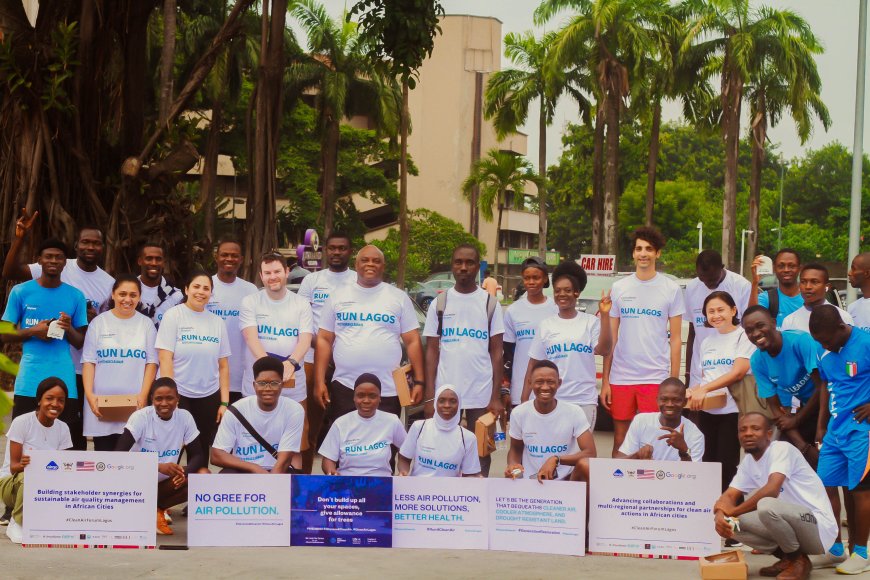
Team advocating for clean air and creating awareness about air pollution in Lagos State, Nigeria
She emphasised that by empowering these leaders to educate their communities, the message can reach those who may not have access to conventional media or the internet. Bola also suggested leveraging social media, content creators, and influencers to spread awareness. Regular programming on popular radio and TV stations and explanatory posters in communities can further enhance public understanding of air quality issues.
Hilina Bayew, an air quality policy research fellow from Ethiopia, highlighted the need to consider health outcomes when promoting outdoor activities. She pointed out that encouraging physical exercise in highly polluted areas like Lagos could exacerbate health conditions. Instead, these practices should be adopted in less polluted regions to ensure positive health outcomes.
Bayew also stressed the importance of personalizing data to make it more accessible and impactful. Tools like air beams, which track individual exposure to air quality, can help personalize and communicate data effectively, making it more relatable to the general public. Accurate and comprehensive monitoring of air quality is essential for informed decision-making.
Governments and organizations should invest in advanced monitoring technologies and expand their networks to cover more areas. Data collected should be transparent and accessible to the public. Effective policies and regulations are crucial for controlling air pollution. Governments should enforce stricter emission standards for vehicles and industrial sources.
Abid Omar, a research and community engagement expert and founder of the Pakistan Air Quality Initiative, raised concerns about the high levels of nitrogen oxide (NOx) emissions from vehicular traffic. He warned against the invisible but dangerous pollution. Omar highlighted the need for targeted measures to reduce traffic emissions and protect public health.
Developing infrastructure that supports cleaner modes of transportation can reduce reliance on motor vehicles. Urban planning should prioritize green spaces and reduce congestion in high-traffic areas. Air pollution is a global issue that requires international cooperation. Sharing knowledge, technologies, and best practices can help countries develop more effective air quality management strategies.
By integrating these strategies and learning from the insights of experts, cities like Lagos can move towards a future where improved air quality and public health are achievable goals. Comprehensive and inclusive approaches are essential for creating sustainable and healthy urban environments.
Source: Collins Odigie Ojiehanor / Lead News Online
The author is a Health and Environmental reporter based in Lagos, Nigeria.


















